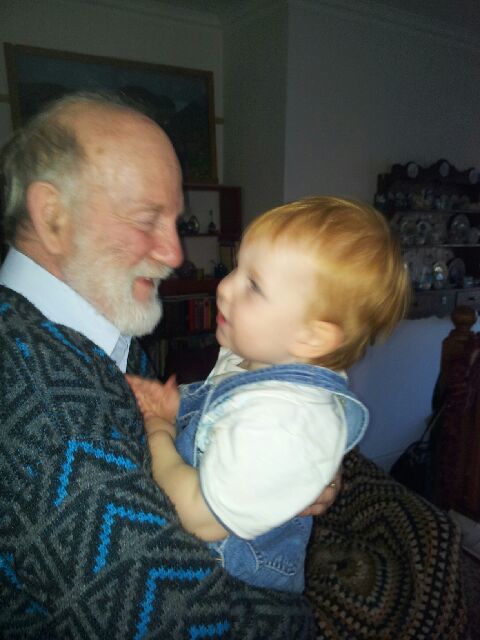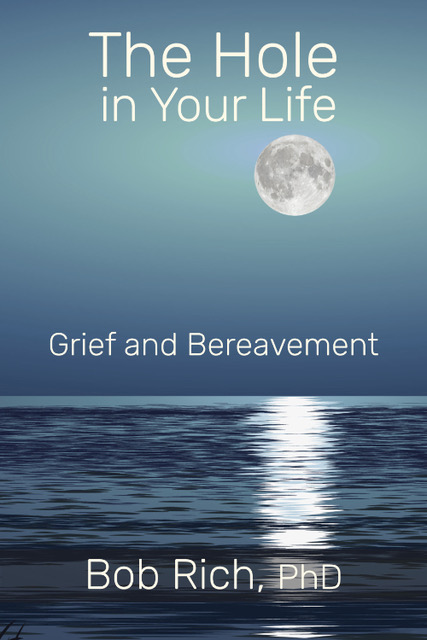Bob, welcome to Canada. You have recently published your 20th book. What is it about?
Thank you, Melanie. We Australians look on Canadians as our cousins. (Well, for me, all sentient beings in the universe are family, but of course some are closer than others.)
This book, The Hole in Your Life: Grief and Bereavement, joins five of my previous books in helping people to cope with suffering: psychological self-help. It took flight in June, in response to the death of my daughter, Natalie, last December.
Was your daughter’s death the only driving force behind you writing The Hole in Your Life?
My computer is a sort of a coolstore with LOTS of clutter on the shelves. I have more ideas than time to develop them, so there they sit, waiting for sunlight before they can sprout and flower.
After I completed From Depression to Contentment: A self-therapy guide and its companion volume, Lifting the Gloom: Antidepressant writings, the next logical step was to continue the series with a book on dealing with grief. So, I did.
One of the greatest joys of my counseling psychology practice was being of service to a young couple. They had separated, each consumed by both blame of the other and guilt, to the point of contemplating suicide. Yes, both of them, and I won’t tell you why, so there. After nine separate sessions with each, then three joint sessions, they reconciled, and as far as I know, they lived happily ever after beyond my six-month follow-up.
Being a storyteller, I based the book around their story, with other clients illustrating points that I couldn’t tie to them.
A necessary part of the book is “what is grief?” I wanted to use extended quotes from an excellent book by an author I admire, and having written the relevant section I emailed it to her, asking for her permission and endorsement. To my surprise what I got in return was hostility. “You keep your sticky fingers off my words!”
I didn’t feel like rewriting tens of thousands of words, so the book went into the coolroom. I focused on fiction, which is more fun anyway.
When Natalie was diagnosed with cancer, I excavated the draft and read it to refresh my memory on the best way to process grief. Rewriting the whole thing was part of the process of doing this processing. (I do love English.)
It is now something like the double helix of DNA. One strand is that young couple’s story. The second is my progression along the grief journey.
In our insane world, a book instructing you on the best way to grieve is a life-saving tool. Sooner or later, all of us lose a person important in our lives. The ways of thinking and doing (“techniques”) that work for bereavement also work for other serious losses, like, say, a stroke, your employer going broke, becoming homeless… insert your personal disaster. And anyone with a shred of empathy is likely to be traumatized by second-hand grief from the ongoing horror story of the news.
And if nothing much bothers you right now, change is the only constant. You can enjoy my writing while you can concentrate on it, and know what to do when, inevitably, heaven flips into hell.
One of the techniques of processing grief is to be of benefit to others as a direct result of your loss. I give several examples in my book, but hey, I’ve given you an example right here. Because The Hole in Your Life reduces the suffering of its readers, it helps me to reduce my suffering. One of the rules of the universe is “The more you give the more you get, and the more you give the more you grow.” And guess what. Being of benefit is one of the techniques validated by research in positive psychology.
So, the more people benefit from my book, the more I benefit. I’d give it away for free, except for two considerations. One is that my publisher quite reasonably expects to have a return on his investment. The second is that people don’t value something free.
I can prove this. Someone near where I live put a fridge outside his house with “Free to a good home” on a sign. It stood there for a week. So, he replaced the sign with “$50. Please knock on my door.” You’ve guessed it. The fridge was gone in the morning.
Therefore, I do the generosity another way. Send me proof of purchase of this book, or any other listed at https://bobrich18.wordpress.com/bobs-booklist/ and you have earned a free electronic book of one of my other titles. Well, if you insist, it can be the same one.
Similarly, if you have earned a free book if you subscribe to my blog, Bobbing Around https://bobrich18.wordpress.com
You’ve had a varied career. Which job did you enjoy the most? What was the one you most disliked?
Oh yes, I careered (dictionary definition: move swiftly and in an uncontrolled way—told you I love English) from career to career, managing to enjoy my stay in each.
I did not dislike any of them until I stopped the activity. Then, looking back, I was grateful for not having to do that anymore.
You can read lost about Buddhist psychology at Bobbing Around, and this is part of it. Whatever is, is, and is all right. Time is an illusion. Only this moment exists. You can live a good life by being contented with this moment, whatever it is.
Right now as I type, I have several points of physical pain. As always, 24/7, I have a ringing in my ears, thanks to too many rifles fired in the army, and too many power tools doing their thing near me. My wife is in hospital, and my son-in-law is waiting for an operation for cancer. And yet, if you read over my rave so far, have you noticed the fun, contentment, laughter?
If I can live this way, so can you.
What career did I enjoy the most? You may find it shocking that it is the current one. Whatever I am fully engaged in is electrifying. This is more of living in the Now.
Right now, I have careered into being a Professional Grandfather.
That started in 1972 when I enjoyed the company of a toddler and a baby whenever I went home from work. This was the year for writing up my PhD thesis, and while research is fun, the literary follow-up is stultifying. Being Mr. Rich, their lecturer, to 709 students meant I couldn’t fall asleep in the library, so I did some side research to forecast the kind of world I had brought my two lovely children into.
The results were horrifying: I accurately predicted today’s world. I have been a humanitarian and environmental activist since. Trouble is, money outvotes passion, so my efforts have failed to unconfirm my predictions.
So, my remaining occupation continues to be striving for a tomorrow for today’s youngsters, and a tomorrow worth living in. The second part is as important as the first: transforming global culture into one ruled by empathy, decency, fairness, generosity, cooperation, taking the long-term view.
What’s next for Bob Rich?
Death of course.
Greedy moneybags can escape taxes, but…
If I die today, I’ll be content with having lived a good life and achieved an enormous amount of spiritual growth, which is the purpose of life. If I live another 20 years, OK, I can put up with it. After all, death is not the end of the book, only of a chapter. If you want the scientific evidence for this, have a read of “The other side of death,” which you’ll find at https://wp.me/p3Xihq-3oq
I have a great deal of personal experience, plus this evidence, which has led me to a theory of the nature of our universe, our role in it, and what life is for.
There is only one way to get 100% proof one way or the other, and that’s to get rid of the body and see what’s after.
My fictionalized autobiography, Ascending Spiral, includes the account of five of my previous lives. If it is accurate, I am here on earth at this time to witness the extinction of humanity, or to be an effective agent in stopping that extinction.
So, Melanie, please join my team and encourage everyone you know to do the same.
All About Bob

Bob Rich, PhD, is a visitor from a faraway galaxy, where he is an historian of horror. So, Earth is his favorite place in the universe. Nowhere else do sentient beings engage in a game of killing non-combatants (war). Nowhere else are child raising practices designed to harm children. And delicious for an historian of horror: nowhere else is the entire global economy designed to destroy its life support system.
Here on Earth, he is disguised as an Australian storyteller, with 20 published books, six of which, and over 40 short stories, have won awards.
He has retired five times so far.
Above all, he is a Professional Grandfather. Anyone born since 1993 is his grandchild. Everything he does strives for a survivable future for them, and one worth surviving in. This means environmental and humanitarian activism: an attempt to change a worldwide culture of greed and aggression into one of compassion and cooperation.
When he was 23, a minister of religion told him he was a Buddhist. On checking, he found his philosophy set out in beautiful words. He decided not to sue the Buddha for plagiarism, as an act of metta (lovingkindness).


Dear Melanie,
I enjoyed reading your interview of Bob Rich. Bob is a very kind hearted and wise man. Thank you very much for giving your readers a chance to learn about him and his books, especially his latest one., The Hole in Your Lufe.”
Never Give Up
With love,
Joan
Thanks for stopping by, Joan. Bob is indeed a kind and wise person.
You two, stop gossiping behind my back! Didn’t you know that my middle name is Trouble?
Dear Bob and Melanie,
We don’t believe that. You do have a good sense of humor!
Never Give Up
Joan
What an interesting interview, Melanie and Bob, including several cheeky answers, of course. I checked the dictionary to find out if careered is a legit word. It was there! Believing the word should have been careened, I discovered careened deals with tilting and careered with recklessness. I’m always learning, especially from Doctor Bob. Thanks. Wishing you great success with your new release!
I’m glad you found our interview interest, J.Q.